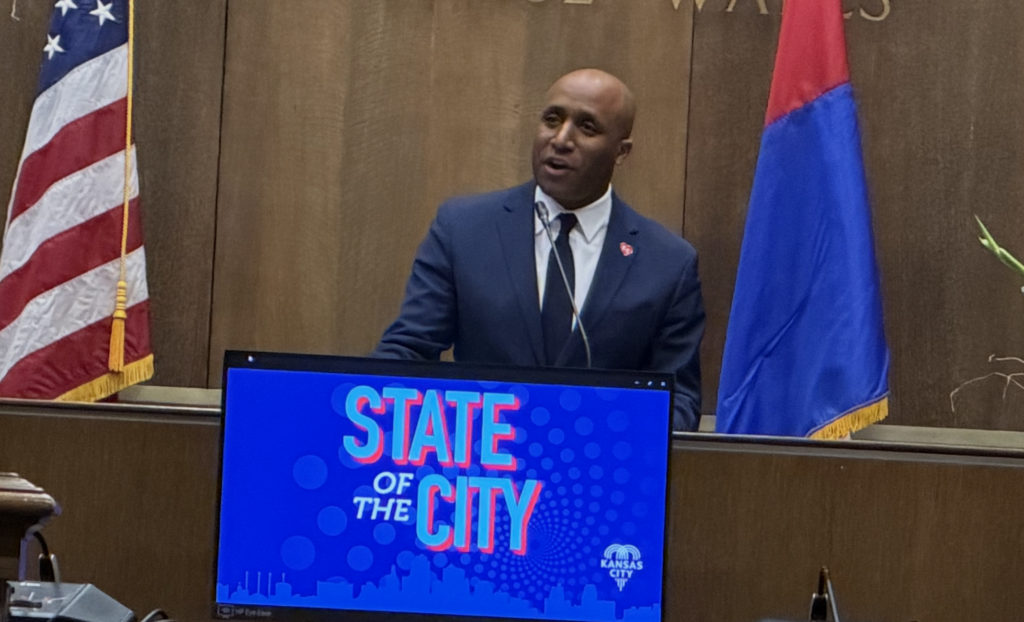Hospital Helper

Former City Councilman Jim Glover had been out of office just six weeks when he made an odd return to the public stage.
“I’ve been promoted, and now I’m a citizen,” he said, paraphrasing Harry Truman, at a June 13 meeting of the Tax Increment Financing Commission, a city agency that scrutinizes developers’ requests for tax breaks. Glover, who ran for mayor but failed to make it out of the February primary, was there to criticize a plan to spend some TIF-generated cash on some relatively harmless fixes in Penn Valley Park, at the Liberty Memorial and along Main Street. The proposal, Glover said, fell outside the intent of the state’s TIF law, and he suggested that there were better uses for the money.
I’m not so sure that Glover was acting solely as a concerned citizen, however. Circumstantial evidence also points to the influence of a condo developer with a seriously checkered past.
First, some background.
Now nearly finished — construction crews are laying fresh sod — the Federal Reserve Bank is being built in a TIF area established by the city in 1994. Normally, TIF areas let developers skim some of the new taxes generated when their projects are finished.
The Fed being the Fed, it doesn’t need TIF to build a new headquarters. So last fall, some neighbors who could use the money came forward.
Diane Burnette, who leads the nonprofit Main Street Development Corp., or Maincor, got together with the parks department and Liberty Memorial officials. They came up with a wish list — new street lights along Main, repairs to limestone walls in Penn Valley Park, a security fence for Liberty Memorial. People cheered. Thomas Hoenig, the CEO of the Federal Reserve Bank of Kansas City, called it a “real plan” that should move forward. Then-Mayor Kay Barnes called it a “win-win.”
But the effort hit a snag when an additional item found its way into the budget.
In February, Will McCarther, a vice president at the health-care company HCA, went before the City Council’s Planning and Zoning committee and spoke in vague terms about building condominiums. HCA had inherited development rights to the site when it bought Health Midwest, and McCarther wanted $2.5 million to demolish the old Trinity Lutheran Hospital, a vacant campus of aging buildings just south of the Federal Reserve.
Barnes and fellow Planning and Zoning committee member Bonnie Sue Cooper were skeptical. The hospital demolition, they said, amounted to a back-door incentive for a proposal they knew nothing about.
Request denied, pending further review.
The following month, a developer surfaced for the Trinity Lutheran site. The Kansas City Star reported that Bob Mayer, a former TIF Commission chairman, and the Reeder Family Trust were going to buy the campus and install condos.
Kansas City has a history of helping out the Reeder Family Trust. Its first big redevelopment project here transformed the war-torn-looking Vista del Rio apartments into The View, a luxury condo high-rise on the northeast edge of downtown. The project got an unprecedented tax break, even though some city officials knew that family patriarch G. Wayne Reeder had been accused of looting two insurance companies. Convicted in federal court in 1996, Reeder spent more than two years in federal custody (“He’s No Angel,” September 16, 2004).
Mayer told the Star that he and the Reeders weren’t going after TIF dollars for their project, which they were calling Park Reserve. (They did, however, file a request for tax abatement; it comes before the City Council on October 31.) Around the same time, however, Councilman Glover began a vigorous effort to repeal the Fed TIF spending plan that the city had already approved.
Was Glover acting in the interest of good government? Or was he helping Mayer, an old friend, and Reeder, the owner of a company that gave $500 to Glover’s campaign?
In April, shortly before his term expired, Glover introduced an ordinance to send the Fed plan back to the TIF Commission. Appearing before the Planning and Zoning committee, Glover described how some of the scheduled improvements could be funded in other ways or were simply bad ideas.
I watched a video of the meeting. At one point, Maincor’s Burnette, along with parks officials, friends of the Off Broadway Theatre in Penn Valley Park and others, stood up to show that the plan had a broad range of support. Glover sat at the witness table by himself, looking very alone.
None of the committee members would even put Glover’s repeal to a vote.
By the time he took his act to the June meeting of the TIF Commission, Glover was out of office. But there he was, making the case that the Fed plan was illegal and unwise. A $300,000 line item for completing the Penn Valley skate park struck Glover as especially foolish. “I don’t see how that relates to the Federal Reserve building or eliminating blight or anything we do under the TIF statute,” he said in his perpetually hoarse, cracking voice.
Midtown had more pressing needs, Glover said. He mentioned the intersections of 39th Street and Main and Linwood and Main … and Trinity Lutheran Hospital.
Glover asked the TIF Commission to reconsider the plan. But Peter Yelorda, the chairman of the TIF Commission, refused, pointing out that City Council had already spoken.
I’ll concede that the Fed TIF plan has its share of flaws. It is unsettling, for instance, to see the Liberty Memorial making yet another lurch for taxpayer money (“The Shaft,” February 22).
But it’s just weird to watch and listen to Glover challenge this plan to a cage match. He hadn’t been much of a hard-ass about TIF during his 12 years on the council. He’d voted to approve plenty of shoddy plans. Yet the one he chooses to attack with a flamethrower is one that makes a lot of people in his old district happy.
When I spoke to him in his law office last week, Glover said that he got more upset about the Fed TIF plan the more he learned about it. He said the expenditures hadn’t been put through the usual tests. And even if they were, the plan, in his eyes, doesn’t square with state law.
Glover told me he’d never spoken to Reeder about the Trinity Lutheran project. He said he hadn’t received any compensation from Reeder or Mayer. He suggested that a truly corrupt public official would have cut a deal, not pitched a public fit.
“Look at my record over 12 years,” Glover said. “I don’t do stuff like that. Never have, never would.”
Maybe he’s simply a stickler for process, a tin ear who found a dubious last cause.
But any deal that Wayne Reeder gets close to deserves a hard look. Next week, I’ll write more about his activities.




